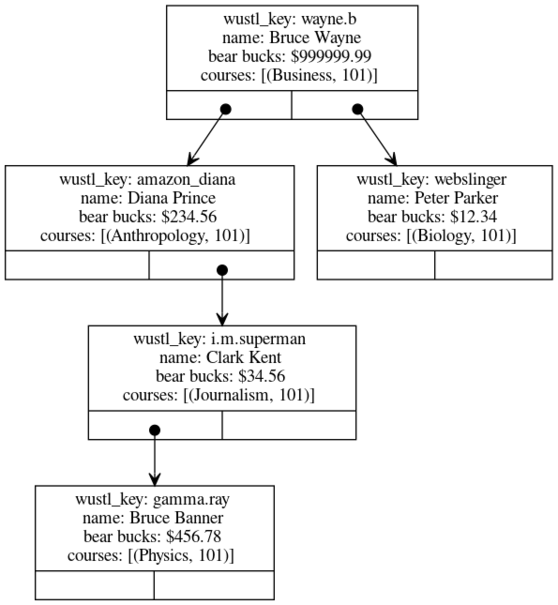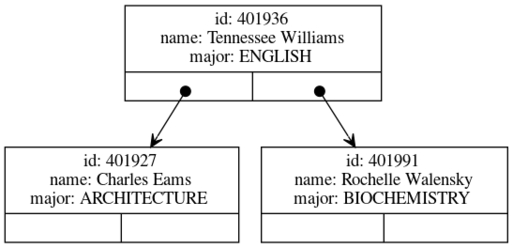Difference between revisions of "Binary Search Tree Assignment"
| Line 5: | Line 5: | ||
<youtube>dxqoq8R3k34</youtube> | <youtube>dxqoq8R3k34</youtube> | ||
| − | <nowiki>val bst = BinarySearchTree.create_empty(String.compare, (fn(s:student) => (#wustl_key s))) | + | <nowiki>type course = (string*int) |
| + | type student = {first_name: string, last_name: string, wustl_key: string, bear_bucks: real, courses: course list} | ||
| + | |||
| + | val bst = BinarySearchTree.create_empty(String.compare, (fn(s:student) => (#wustl_key s))) | ||
val (bst, _) = BinarySearchTree.insert(bst, {first_name="Bruce", last_name="Wayne", wustl_key="wayne.b", bear_bucks=999999.99, courses=[("Business", 101)]}) | val (bst, _) = BinarySearchTree.insert(bst, {first_name="Bruce", last_name="Wayne", wustl_key="wayne.b", bear_bucks=999999.99, courses=[("Business", 101)]}) | ||
val (bst, _) = BinarySearchTree.insert(bst, {first_name="Peter", last_name="Parker", wustl_key="webslinger", bear_bucks=12.34, courses=[("Biology", 101)]}) | val (bst, _) = BinarySearchTree.insert(bst, {first_name="Peter", last_name="Parker", wustl_key="webslinger", bear_bucks=12.34, courses=[("Biology", 101)]}) | ||
Revision as of 03:48, 6 October 2022
We will implement a binary search tree data structure as well as Higher Order Function Hall of Fame inductees: find and fold.
Contents
Background
student record example
type course = (string*int)
type student = {first_name: string, last_name: string, wustl_key: string, bear_bucks: real, courses: course list}
val bst = BinarySearchTree.create_empty(String.compare, (fn(s:student) => (#wustl_key s)))
val (bst, _) = BinarySearchTree.insert(bst, {first_name="Bruce", last_name="Wayne", wustl_key="wayne.b", bear_bucks=999999.99, courses=[("Business", 101)]})
val (bst, _) = BinarySearchTree.insert(bst, {first_name="Peter", last_name="Parker", wustl_key="webslinger", bear_bucks=12.34, courses=[("Biology", 101)]})
val (bst, _) = BinarySearchTree.insert(bst, {first_name="Diana", last_name="Prince", wustl_key="amazon_diana", bear_bucks=234.56, courses=[("Anthropology", 101)]})
val (bst, _) = BinarySearchTree.insert(bst, {first_name="Clark", last_name="Kent", wustl_key="i.m.superman", bear_bucks=34.56, courses=[("Journalism", 101)]})
val (bst, _) = BinarySearchTree.insert(bst, {first_name="Bruce", last_name="Banner", wustl_key="gamma.ray", bear_bucks=456.78, courses=[("Physics", 101)]})
student record example with int as key
datatype department = COMPUTER_SCIENCE | ENGLISH | ARCHITECTURE | BIOCHEMISTRY
type student = {id: int, name: string, major: department}
val tennessee_williams = {id=401936, name="Tennessee Williams", major=ENGLISH}
val charles_eams = {id=401927, name="Charles Eams", major=ARCHITECTURE}
val rochelle_walensky = {id=401991, name="Rochelle Walensky", major=BIOCHEMISTRY}
val bst = BinarySearchTree.create_empty(Int.compare, fn(s:student) => #id s)
val (bst,_) = BinarySearchTree.insert(bst, tennessee_williams)
val (bst,_) = BinarySearchTree.insert(bst, charles_eams)
val (bst,_) = BinarySearchTree.insert(bst, rochelle_walensky)
order
SML's General structure's order
datatype order = LESS | EQUAL | GREATER
Values of type order are used when comparing elements of a type that has a linear ordering.
Functions which take (('k * 'k) -> order) functions behave as Int.compare does:
- compare (i, j)
- returns LESS, EQUAL, or GREATER when i is less than, equal to, or greater than j, respectively.
list
We will implement some of the higher ordered functions list provides on our binary tree.
traversal order
Code to Implement
| file: | src/main/sml/binary_tree/binary_tree.sml | |
| functions: | create_empty find insert remove fold_lnr fold_rnl debug_message to_graphviz_dot |
signature BINARY_SEARCH_TREE = sig
type 'k compare_function = (('k * 'k) -> order)
type ('e,'k) to_key_function = 'e -> 'k
type ('e,'k) tree;
val create_empty : ('k compare_function * ('e,'k) to_key_function) -> ('e,'k) tree
val find : (('e,'k) tree * 'k) -> 'e option
val insert : (('e,'k) tree * 'e) -> (('e,'k) tree * 'e option)
val remove : (('e,'k) tree * 'k) -> (('e,'k) tree * 'e option)
val fold_lnr : ((('e * 'b) -> 'b) * ('b) * (('e,'k) tree)) -> 'b
val fold_rnl : ((('e * 'b) -> 'b) * ('b) * (('e,'k) tree)) -> 'b
val debug_message : (('e -> string) * (('e,'k) tree)) -> string
val to_graphviz_dot : (('e -> string) * ('k -> string) * (('e,'k) tree)) -> string
end
type
provided compare_function and to_key_function type synonyms
type 'k compare_function = (('k * 'k) -> order)
type ('e,'k) to_key_function = 'e -> 'k
required (at minimum) tree
(* TODO: replace unit with the datatype(s) and/or type synonym(s) you decide upon *)
type ('a,'k) tree = unit
create_empty
fun create_empty(cmp : 'k compare_function, to_key : ('e,'k) to_key_function) : ('e,'k) tree =
raise Fail("NotYetImplemented")
find
reference: List.find
fun find(t : ('e,'k) tree, key : 'k) : 'e option =
raise Fail("NotYetImplemented")
insert
fun insert(t : ('e,'k) tree, element : 'e) : (('e,'k) tree * 'e option) =
raise Fail("NotYetImplemented")
NOTE: if the key for the specified item matches a key already in the tree, the previous item is replaced.
insert returns a pair containing the new tree and the (optional) replaced value.
remove
fun remove(t : ('e,'k) tree, key : 'k) : (('e,'k) tree * 'e option) =
raise Fail("NotYetImplemented")
remove the item whose key matches item_key, if it is found.
returns a pair of the modified tree and the (optional) removed item.
Remove contains the most challenging aspect of this studio. When instructed to remove a node from a tree, there are several cases:
not found
What will indicate that you reached the point where you know the node is not found in the tree?
note: this has a trivial solution.
no child in the left tree
How will you detect this pattern?
note: this has a trivial solution.
no child in the right tree
how will you detect this pattern?
note: this has a trivial solution.
both children are present
If you need to remove a node and it has both children, now you have a legit problem. You must maintain a correct binary search tree.
standard approach
A common approach is to choose one of the following:
- remove the right most descendant in the left child, and promote it to be the node at the current level, or
- remove the left most descendant in the right child, and promote it to be the node at the current level
The image below shows finding the left most child in the right subtree for promotion:
Building a helper function will likely be helpful.
alternate approach?
Can you come up with a different approach that produces a clean solution while still providing O(lg(N)) expected performance?
fold
reference: List.foldl foldr
fold_lnr
(*
* depth-first, in-order traversal
* https://en.wikipedia.org/wiki/Tree_traversal#In-order_(LNR)
*)
fun fold_lnr(f, init, t) =
raise Fail("NotYetImplemented")
fold_rnl
(*
* depth-first, reverse in-order traversal
* https://en.wikipedia.org/wiki/Tree_traversal#Reverse_in-order_(RNL)
*)
fun fold_rnl(f, init, t) =
raise Fail("NotYetImplemented")
Debugging
debug_message
fun debug_message(element_to_string, t) = "(Optional) TODO: BinarySearchTree.debug_message"
debug_binary_search_tree
file: debug_binary_search_tree.sml
in folder: src/test/sml/run_binary_search_tree_testing
BinarySearchTree to_graphviz_dot
fun to_graphviz_dot(element_to_string, key_to_string, t) =
let
(* TODO: bind root *)
val root = raise Fail("NotYetImplemented")
(* TODO: bind to_key *)
val to_key = raise Fail("NotYetImplemented")
fun node_to_dot(element) =
"\t" ^ key_to_string(to_key(element)) ^ " [label= \"{ " ^ element_to_string(element) ^ " | { <child_left> | <child_right> } }\"]"
fun edge_to_dot(parent_element_opt, tag, element) =
case parent_element_opt of
NONE => ""
| SOME(parent_element) => "\t" ^ key_to_string(to_key(parent_element)) ^ tag ^ " -> " ^ key_to_string(to_key(element))
fun nodes_to_dot(bst) =
raise Fail("NotYetImplemented")
fun edges_to_dot(bst, parent_element_opt, tag) =
raise Fail("NotYetImplemented")
in
"digraph g {\n\n\tnode [\n\t\tshape = record\n\t]\n\n\tedge [\n\t\ttailclip=false,\n\t\tarrowhead=vee,\n\t\tarrowtail=dot,\n\t\tdir=both\n\t]\n\n" ^ nodes_to_dot(root) ^ edges_to_dot(root, NONE, "") ^ "\n}\n"
end
graphviz dot vs code
search for "graphviz dot" in vs code extensions marketplace
Testing
Complete
| source folder: | src/test/sml/binary_search_tree |
| how to run with CM.make verbosity off: | sml -Ccm.verbose=false run_binary_search_tree_testing.sml |
| how to run with CM.make verbosity on: | sml run_binary_search_tree_testing.sml |
note: ensure that you have removed all printing to receive credit for any assignment.
Without Remove
sml -Ccm.verbose=false run_binary_search_tree_testing.sml --remove=false
sml run_binary_search_tree_testing.sml --remove=false
Pledge, Acknowledgments, Citations
| file: | studio-binary-search-tree-pledge-acknowledgments-citations.txt |
More info about the Honor Pledge



